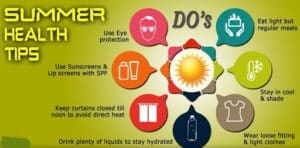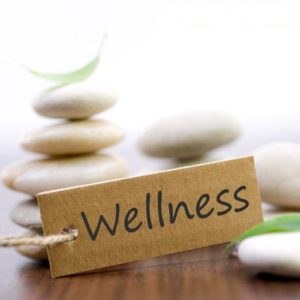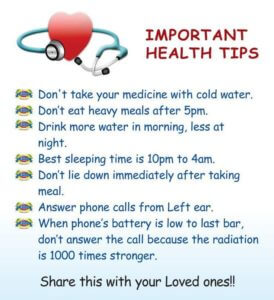
Wellness Tips for Summer
The lazy days of summer are here and for many, that means taking a long-awaited vacation filled with sun and fun. While travel offers a host of health benefits, like lowering your blood pressure and stress levels, it can also lead to unforeseen illnesses and pitfalls. Fortunately, a little planning and foresight can keep you healthy and safe while vacationing this summer.
We all know that winter is cold and flu season, but that’s no reason to stop the self-care and good hygiene as the weather warms up. There are all varieties of summer sickness (think summer rash and e-coli) that you need to know about in order to best protect yourself, your kids, and your pets. These illnesses range from the annoying to death so it’s important to be aware and take care to avoid exposure if at all possible.
You tick through your list. Icy water bottle? Check. Sunscreen with the highest SPF you can find? Check. Trusty, wide-brimmed hat? Check.
Not so fast. Did you know super-cold drinks can make your stomach cramp? Or that other thing, like how well you slept last night or what medicines you’re taking could affect how well your body adjusts to the heat? They also have a lot to do with whether you feel well or get sick in extreme temperatures.
If you’re an outdoor-type, you might believe you know how to prepare for the heat. But it actually takes more thought and planning than you might think,
Generally speaking, insects or contaminated water can spread summer sickness during activities that we only partake in during these warmer months. With that in mind, you can take steps to prevent summer sickness when you’re armed with knowledge and a little bit of know-how. Here are common summer illnesses you need to know about. Stay healthy and happy this Summer!!
When you spend too much time in the sun, your internal body temperature goes up. That can lead to heat rash or heat exhaustion. It happens when your body is so hot it can’t cool itself. You’re at even more risk if you don’t drink enough liquids or you’re pregnant, overweight, elderly, very young, or have heart disease.
In extreme cases, you can get exertional heatstroke. This can cause your central nervous system to shut down and your internal organs to fail. It can be fatal. But if you keep a cool head and use common sense when you’re out in super-hot summer weather, you should be fine.
Click here for Tips to help you stay well in the heatTake Cover : A tank top and shorts might seem like the best choice, but many fabrics just trap warmth. Bare arms leave you open to sunburn and skin cancer. You’re better off in a light-colored airy blouse or long-sleeved shirt that lets air flow through. You can also find clothing with built-in UV protection.
Athletes have regular checkups to make sure they’ll be safe in the heat for long periods. But it’s actually a good idea for anyone.
Dump Heat to Cool your Core : This means taking frequent breaks to lower your temperature. You’ll reduce your chances of getting sick. Some people, like those with sickle cell (an inherited disorder that affects red blood cells ). trait, have a harder time keeping cool. That’s Extreme heat can make them even weaker and lead to muscle breakdown.
Pair Up : If you’re going outdoors with someone else, they can get a sense if you are not acting right. They can tell if you have any of the early effects of heat sickness, like dizziness or confusion. You can remind each other to drink lots of water and take frequent breaks in the shade. Also, if there is trouble, someone can provide aid or seek help.
Watch your Intake: Liquids are a must in the super-hot summer heat. But avoid alcohol and drinks with caffeine or lots of sugar. They’ll cause you to lose more body fluids. Plain water is the best. Stay away from certain medications, too, especially those for thyroid and ADHD or anything that speeds up your metabolism. Diuretics and laxatives also dehydrate you, so avoid those as well.
Go To bed Early : Try and maintain a healthy sleep routine, even while on vacation.
You should be well-rested and hydrated before any outdoor adventure. When your energy is low, it weighs you down, and your odds of getting sick go way up.
Protect your Eyes : It’s important to protect your eyes when you’re out in the sun. Choose sunglasses that block at least 99 percent of ultraviolet A and B rays. If you’re swimming or playing sports, use protective eyewear.
Eat Breakfast : Many experts believe the first meal of the day is vitally important, so don’t skip it if you’re on summer vacation. Make sure your body has the fuel it needs to get through the day by eating a breakfast packed with protein and healthy carbs, like oatmeal and eggs. A healthy breakfast first thing in the morning actually jump-starts your metabolism.
Make hand washing a priority : Washing your hands with warm soapy water for about 30 seconds is at least as effective as using antibacterial products, experts note.
Limit Alcohol : Who doesn’t want to relax with a drink or two on vacation? If you’re going to drink, be sure to do so in moderation. That means skipping the shots. They will get you drunk faster, which can lead to serious dehydration if you forget to drink water.
Stay Out of the Sun : The peak hours when the sun is up during the day are from 11 am to 4 pm. These are the hours when the UV rays of the sun are at its strongest and most harmful to your skin. Schedule morning activities up until 11 am and afternoon ones from 4 pm onwards. If you do have to be out during the hottest hours of the day, wear sunscreen with an SPF of 15 or higher 20-30 minutes before you go outside of the house. Also, wear sunglasses and a hat you can carry an umbrella as well.
Be Mindful of the clothes you wear : Wearing the right kind of clothes during the hottest time of the year will keep your body in optimal shape. That means tight-fitting pieces like skinny jeans, muscle shirts, or any shirt or bottoms colored black are a no. Instead, go for clothes that are light-colored, lightweight, and lose clothes that make you feel comfortable despite the heat.
Wipe your sweat immediately : The added humidity summer brings limits your body sweat from immediately evaporating. This isn’t good because a humid body temperature and environment attract pests like mosquitoes, leading to an even deadlier slew of sicknesses such as yellow and dengue fever.
Enteroviruses Nobody wants to think about how gross water can get, right? Swimming in the ocean, a stream or a lake, you and your kids will probably end up swallowing some, putting you at risk of exposure to enteroviruses—spread by fecal contamination in water. Once one family member has it, it can spread easily to the entire household. Symptoms range from common cold issues to an infection of the heart or brain. Enterovirus is usually not a big deal but if you’re pregnant or nursing and you may have been exposed, talk to your doctor right away.
Hand, Foot & Mouth Disease This is actually a form of enterovirus that’s highly contagious and causes blisters on the hands, feet, and mouth. It causes discomfort and an overall feeling of yuck but usually passes within 10 days and doesn’t require treatment.
E-coli Again with the dirty water? Found in sewage-contaminated water, e-coli causes incredible digestive upset that can lead to dehydration and coinciding complications. You’ll know if your store-bought foods are contaminated because it’s usually all over the news, but do we need to say it again? Don’t drink the water!
Whooping Cough We hate to say it but whooping cough is commonly spread at summer camp. However, that’s no reason to keep your child from going. Vaccination and good hygiene are excellent preventatives, so remind your kids to wash their hands often. And maybe have a general rule that there’s no kissing at camp? We think it’s brilliant. For multiple reasons.
Food Poisoning When food is left out in the heat for an extended period of time, bacteria grow. Food poisoning (foodborne illness) is more prevalent during the summer because the microorganisms that cause it grows most quickly when the temperature is between 90 and 100 degrees. It’s like they were made for summer picnics, right? Monitor the temperature of your food, put things away promptly, and when in doubt, toss it!
Norovirus: Norovirus (like salmonella and listeria ) is another super contagious stomach bug transmitted through contaminated water or food, from contact with an infected person, or through touching a contaminated surface. It leads to digestive upset and is most severe for the young and old. Prevent norovirus with great hygiene and lots of handwashing.

Wellness Tips for Summer
Sunburn : Everyone knows the quickest way to go from pure relaxation to pure pain is to stay out in the sun too long without protection. And the pain isn’t even the worst part. You also put yourself at greater risk of developing skin cancer and age your skin.
That’s why using sunblock is a necessity. You should wear it every time you go out and reapply it every couple of hours. To avoid the harmful chemicals in some commercial brands, you can use coconut oil’s homemade mask.
If you do happen to get caught out in the sunshine without protection, there are a variety of things you can use to help heal a burn. Aloe Vera, lavender oil, and cooled chamomile tea are all known to be effective at helping to soothe and heal a burn. A cold shower can also help.
Swimmer’s Ear : Ear infections can be quite painful and can keep you out of the pool. They are usually caused by a little bit of water getting trapped in your ear after swimming. That water creates the perfect environment for bacteria to grow and you’re soon infected.
The best way to avoid a swimmer’s ear is to avoid immersing your head entirely in the water, or if you do, not going too deep. You can also try wearing earplugs and not using Q-tips or cotton swabs to clean your ears, which can make them vulnerable. If you do end up with an infection both garlic oil and Mullein oil can help heal it faster.
Motion Sickness : On a long, hot car ride up to the Office / long journey it’s easy to start feeling nauseous. But it doesn’t have to ruin your journey. The best way to prevent feeling ill is to use ginger. You can put in your water or simply chew on a piece.
If you do often get motion sickness, you should avoid sitting in the backseat, drink plenty of water, and eat a snack with some protein in it. If worst comes to worst, make sure to at least ask whoever is driving to pull over.
Heat Rash : On most humid days of summer, heat rash can be a very real concern. If you sweat enough, your sweat glands can actually get blocked, and the excess moisture can cause skin irritation, itching, and redness. The best way to prevent this from happening is by staying cool. Drink plenty of cool water, wear light clothing that breathes, and try to avoid staying in the sun for too long. You can use cooled chamomile tea for a cooling effect, or have a bath with a few drops of lavender oil and baking soda.
Headaches : Between the heat and the bright sunlight, people often get bad headaches more often during the summer. This can be caused by dehydration or by forgetting to eat. The heat has been known to slow down the hunger reflex. The best way to prevent these headaches is by eating and drinking regularly. If you do get a headache though, adding some feverfew (member of the daisy family, and its leaves are used to create the herb), peppermint, or chamomile to your water can all help relieve the pain. Stretching and taking some deep breaths can also help.
Summer Cold : Though we often think of the cold as something we can only catch when it’s cold outside, you can in fact pick up the virus at any time of the year. Travelling, in particular, can both stress your immune system and expose you to new viruses. The best way to prevent yourself from catching a summer cold is to eat a diet full of immune system boosting vegetables, such as garlic, onion, mushrooms, and greens.
Athlete’s Foot : The added heat and humidity during the summer creates the perfect environment for an athlete’s foot to grow. The fungus thrives in dark, moist conditions. As a result, you should try to keep your feet as dry as possible and wash them twice a day. Try wearing open shoes if you can. Washing your feet in a bath of Epsom salts or apple cider vinegar can also help to kill the fungus.
Eat Fresh : One of the best things about summer is access to fresh and healthy fruits and vegetables. Better yet: many of summer’s fruits and vegetables are brimming with health benefits. Use this time to focus on eating your colors — Fresh corn has natural antioxidants and benefits for your eyes, tomatoes contain lycopene and may protect your skin from sunburn, the watermelon keeps you hydrated, and raspberries are a great source of fiber—some of it soluble in the form of pectin, which helps lower cholesterol.
Protect against bugs and poisonous Plants : Gardening, camping, hiking, and many other outdoor activities are great ways to enjoy exercise and nature. However, poisonous plants, such as Poison Ivy, Oak, or Sumac, as well as ticks and other parasites, can put a damper on your outdoor adventures. Decrease your risk by using protective clothing, such as long pants, long-sleeved shirts, as well as lotions, creams, and sprays that protect against bugs and poisonous plants.
Stay in shape : We’re often more conscious of what we eat in the summer since we’re more likely to squeeze into shorts, bathing suits, and sleeveless tops. Summertime is a great time to start healthy habits that can last all year, such as cutting back on high-fat meats and mayo-drenched salads, adding healthy grains to your diet instead of chips and snacks, and drinking lots of water. It’s also a great time to take advantage of longer days and start an exercise plan.
Catch Vitamin D Rays : Summer is a great time to get the necessary amounts of Vitamin D, which helps to boost your mood, immunity, and energy! While you can get small amounts from food, the best way to reach your needed Vitamin D levels is by sun exposure to the skin. Although sunscreen is important, it can unfortunately interfere with the absorption of Vitamin D. 15-30 minutes is adequate unprotected exposure for Vitamin D.
Stick to your regular wellness schedule : There’s no vacation when it comes to your health! Continue your normal wellness schedule throughout these months in order to stay on track and maintain good health and happiness. In fact, summer may be a great time to try something new to improve wellness like Yoga, Aerobics, Zumba, Reiki, or Massage Therapy. summer is a great time to explore wellness opportunities!
Nutritional Supplements : Can support you with a greater amount of physical energy, enhancing your summer activities. The B-complex vitamins are calming to the nervous system and helpful for cellular energy production, while vitamin C and the other antioxidants protect your body from stress, chemical pollutants, and the biochemical by-products of exercise.
Take some Special Summer Time : with your family, kids, and friends who share the enjoyment of the outdoors. Plan a fun trip if you’re able and motivated for a day or longer — hiking in the wild, camping, playing at the river, or a few days resting at the ocean. Rekindling our Earth connection has benefits that last beyond this season, continuing to enrich the whole of your life.

Quotes for Wellness :
“Health is a state of the body. Wellness is a state of being”
“A healthy outside starts fro Inside”
“Wellness is the natural state of my body”
“If you think wellness is expensive, then try Illness”
“If you never try, you will never know”
“There is no giant step that does it. Its a lot of little steps”
“Life is not merely being alive, but being well”
“The key to wellness is to accept personal responsibility for your health and wellness”
“If not now….. then when? “
“Yes You Can”


